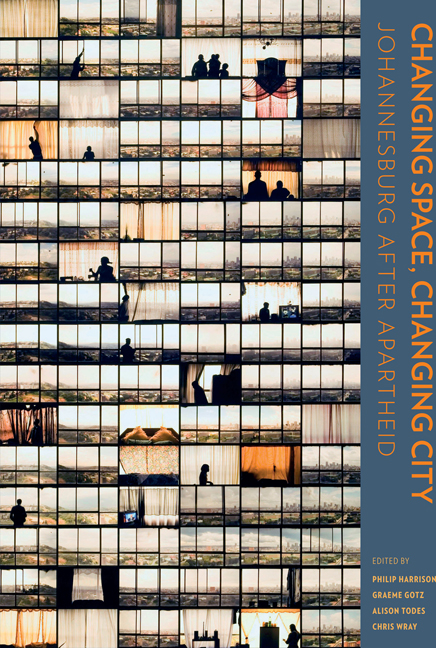Book contents
- Frontmatter
- Contents
- Preface
- Cartography
- 1 Materialities, subjectivities and spatial transformation in Johannesburg
- Section A The macro trends
- Section B Area-based transformations
- Section C Spatial identities
- 23 Footprints of Islam in Johannesburg
- 24 Being an immigrant and facing uncertainty in Johannesburg: The case of Somalis
- 25 On ‘spaces of hope’: Exploring Hillbrow's discursive credoscapes
- 26 The Central Methodist Church
- 27 The Ethiopian Quarter
- 28 Urban collage: Yeoville
- 29 Phantoms of the past, spectres of the present: Chinese space in Johannesburg
- 30 The notice
- 31 Inner-city street traders: Legality and spatial practice
- 32 Waste pickers/informal recyclers
- 33 The fear of others: Responses to crime and urban transformation in Johannesburg
- 34 Black urban, black research: Why understanding space and identity in South Africa still matters
- Contributors
- Photographic credits
- Acronyms
- List of plates
- List of figures
- List of tables
- Index
32 - Waste pickers/informal recyclers
from Section C - Spatial identities
Published online by Cambridge University Press: 20 April 2018
- Frontmatter
- Contents
- Preface
- Cartography
- 1 Materialities, subjectivities and spatial transformation in Johannesburg
- Section A The macro trends
- Section B Area-based transformations
- Section C Spatial identities
- 23 Footprints of Islam in Johannesburg
- 24 Being an immigrant and facing uncertainty in Johannesburg: The case of Somalis
- 25 On ‘spaces of hope’: Exploring Hillbrow's discursive credoscapes
- 26 The Central Methodist Church
- 27 The Ethiopian Quarter
- 28 Urban collage: Yeoville
- 29 Phantoms of the past, spectres of the present: Chinese space in Johannesburg
- 30 The notice
- 31 Inner-city street traders: Legality and spatial practice
- 32 Waste pickers/informal recyclers
- 33 The fear of others: Responses to crime and urban transformation in Johannesburg
- 34 Black urban, black research: Why understanding space and identity in South Africa still matters
- Contributors
- Photographic credits
- Acronyms
- List of plates
- List of figures
- List of tables
- Index
Summary
On any weekday in any street in Johannesburg one might encounter a lean, bowed person straining to pull a vast load up a hill, round a bend or across a busy traffic intersection, cramping to the side of the road out of the way of impatient cars and trucks, or pausing to lean on the trolley handles to catch a breath. Bulky brown hessian bags squatting on flat platform trolleys are stuffed with cardboard or paper, metal or plastic, making their trundling way by human muscle power alone to a recycling depot where their contents can be exchanged for cash.
Daily the waste discarded by businesses and residents of Johannesburg is actively salvaged in the transition between private property and public landfill. In the dark early hours of the morning, empty trolleys and deflated bags rumble briskly from central areas to the suburbs, scheduled for the city's refuse removal service that day. The journey out can be many kilometres and several hours of walking. Reclaimers must arrive at bursting wheelie bins before the Pikitup trucks do, before the formal recycling companies collect their hauls, before pedestrian competitors arrive with rattling trolleys hungry for loading. Bins and bags are systematically trawled for particular goods: white A4 paper perhaps, PET plastics or scrap metal. When hessian bags are full enough to make the long journey back worthwhile – today, or perhaps only tomorrow, after another suburb is scoured – the backbreaking journey to the depot begins.
Both physically and institutionally, recyclers operate in in-between places and spaces: recycling businesses use their hauls – indeed depend on them for source material – but the recyclers are self-employed, without wages, job protection, insurances or medical aid. Their strenuous manual labour, eye for the cash value in rubbish, diversion of volumes of material from landfills, and low carbon footprints are not lauded and applauded. City residents and businesses generating waste are mostly ambivalent – occasionally recognising and facilitating the reclaiming process on their doorstep, sometimes complaining and chasing away ‘dirty vagrants’, but mostly ignoring their fellow residents and road users. City authorities, too, mostly overlook recyclers while they do their work – indeed, appear blind to their existence and their labour. A different response, however, is provoked at the gathering points for sorting and storing accumulated materials, and by the recyclers’ nightly sleeping arrangements.
- Type
- Chapter
- Information
- Changing Space, Changing CityJohannesburg after apartheid, pp. 539 - 545Publisher: Wits University PressPrint publication year: 2014



